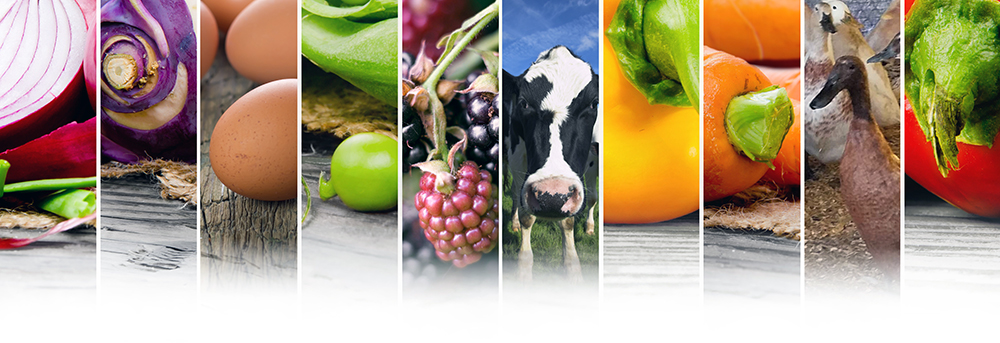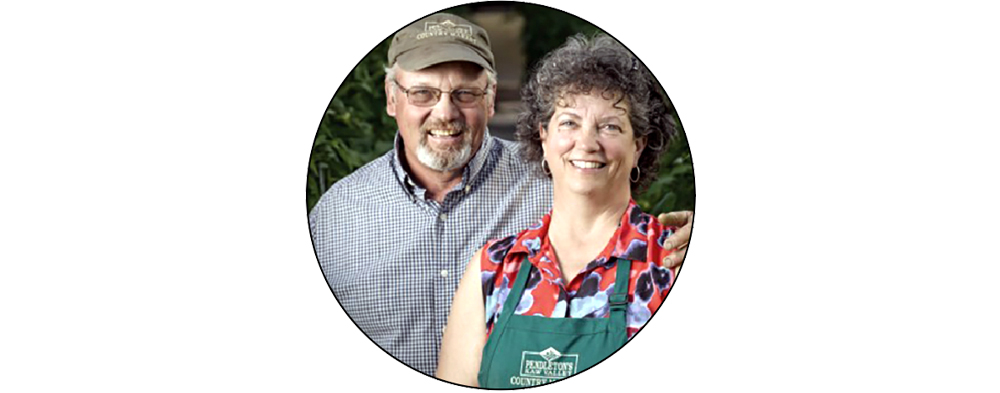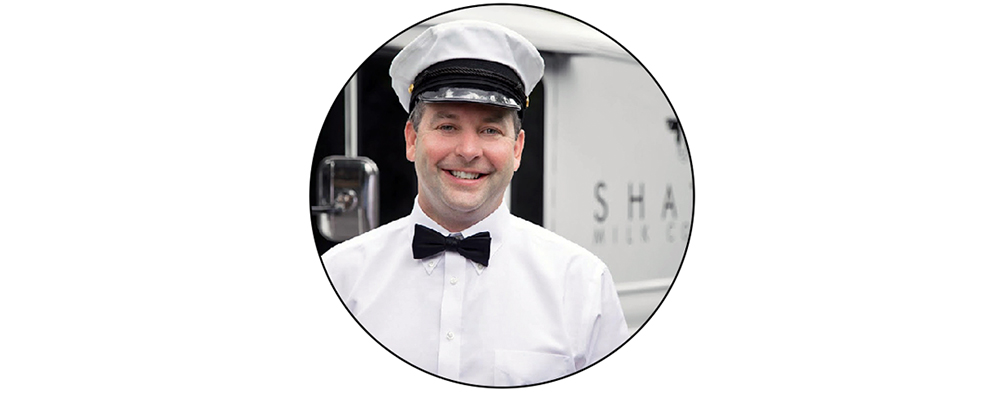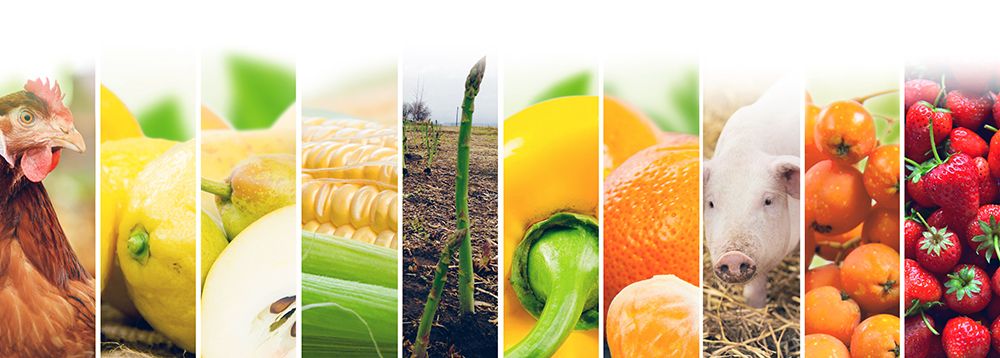
Behind every crisp spear of asparagus, juicy hamburger and ice-cold glass of milk, there’s a team of people working to make your meals possible. But local farmers aren’t just growing and producing food, they’re running complex businesses, working to overcome challenges, and giving back to their environments and communities.
Who exactly are these farmers? We’re so glad you asked.

Pendleton’s Country Market
John Pendleton was in his basement for maybe 30 seconds before a tornado hit his and wife Karen’s Lawrence home on May 28. It wasn’t loud like a freight train—the Pendletons live next to railroad tracks and know what that sounds like—but dirt rained down on them as the tornado struck their land. When they surfaced, John and Karen saw the numerous windows the storm had knocked out of their home, the doors it had blown off, and the 25-foot wall of their garage it effortlessly removed.
Then they saw the damage to their farm, Pendleton’s Country Market, which John’s father started more than 70 years ago. Five of their seven greenhouses were destroyed, as was their machine shed. Debris littered the ground.
“My reaction was, I don’t know if I can do this again,” Karen recalls.
Because it was far from their first experience with disaster. First a fire gutted their house in 1983, then during flooding in 1993, they lost crops and land. In 2006, a microburst destroyed two greenhouses and two concrete silos. Now in their 60s, John and Karen had their sights set on slowing down rather than tackling the long process of rebuilding.
Friends, colleagues, and community members rushed to the family’s aid, helping with clean up, storing the flowers and asparagus harvested the two days before the storm hit, providing meals for volunteers and temporary housing for the family. A former employee set up a GoFundMe campaign.
Through their community supported agriculture (CSA) program, which provides participants with a regular supply of seasonal produce, flowers for weddings and events, and sales of what produce and flowers they could salvage at Lawrence farmers’ markets, the Pendletons have been able to lessen the tornado’s blow. During August, they shut down their popular farm store to focus on cleaning up their property, still piled with scraps of wood and metal more than two months after the storm rolled through.
As Karen continues to negotiate with their insurance company, she isn’t sure what the future holds—one of the most frustrating parts of their experience, she explains.
“We’re no different than any other small business, whether it be hit by a tornado or the owner gets cancer, it just stops. You put your life on hold to get through it and then hope that you can continue on. I think that’s the hardest part, just being on hold.”

Barham Family Farm
Kenny Barham always wanted a cow. His wish came true many times over. And in addition to 60 cows, he has 4,000-5,000 broiler chickens, 900-1000 meat ducks, 100 turkeys, 700-800 laying hens, 40 laying ducks, plus a handful of hogs at Barham Family Farm in Kearney, Missouri.
The farm has been in his wife Annette’s family for more than a century, and the couple took it over about 30 years ago. Traditionally, they sold to barns that would give them whatever the going rate was that day, but in the last decade, the Barhams transitioned to offering their products to area restaurants (including Fox & Pearl, Tannin, and The Antler Room, to name a few) and directly to consumers at the Liberty and Kearney farmer’s markets as well as through their own Wildflower Dreamz farm store. The shift not only allowed the family to set their own prices, but it brought them into contact with the people enjoying what they produce.
“I really love going to the farmer’s market to interact with the people and talk with them,” Kenny says. “Somebody will come up to me and say, ‘Oh my gosh, I’ve been looking for a farm like yours.’ I just kind of puff my chest out. It just makes me feel proud that we’re raising something that people are looking for and want.”
In some respects, their growth has been organic—they kept chickens for themselves, but then people started asking for chickens, and then eggs, a business kept growing and growing, Kenny says. They started raising ducks after chef Renee Kelly, who was buying chickens from the farm at the time, requested them.
“The demand and the growth have gotten better every year,” Kenny says.
With business booming, the biggest challenge now is finding time to get away. Kenny and Annette recently left the farm for more than a night for the first time in three or four years. Kenny explains it’s hard to leave because their work is so specialized and requires an intimate knowledge of the farm’s subtleties—one he would like to see future Barham generations embrace.
“Hopefully, it’s something that my sons or grandsons can take over if they want to, and hopefully they’re willing to keep it going.”

Shatto Milk Company
Gathered around the dinner table, their defacto boardroom, the Shattos had a decision to make in the late ’90s. Their dairy farm had been in the family for 100 years, but falling milk prices and climbing commodity prices were forcing them to consider walking away.
Head to the dairy section of pretty much any Kansas City grocery store and you can see that they decided to stick it out, changing their business model to bring their milk straight to customers. The first bottles hit shelves in 2003.
“When we started in ’03, we were a little naive about what it all meant, to be going from being dairy farmers to business owners and marketers and everything else,” Shatto Milk Company Vice President Matt Shatto says. “We had to pretty quickly determine what we wanted to be when we grew up and we had to really find out how we were going to scale to fulfill that need. It took us probably seven years to do it.”
Committed to staying focused on their community rather than expanding into other markets, Shatto developed a product line that now includes premium ice cream, artisan cheese, and butter in addition to milk and cream. Several years ago, Matt and company also launched Shatto Home Delivery to stay competitive in the food marketplace while making it more convenient and accessible for families to buy local food. In addition to Shatto’s products, options range from meat and bread to pantry staples and even dog food.
Despite all the ways Shatto Milk Co. has grown in the last 15 years, Matt says one of the biggest surprises has been seeing customers come out to the farm in Osborn.
“You can drive 30 minutes to an hour and actually see the dairy farm that produces the milk that you enjoy,” he says. “It’s probably the best thing that has ever happened to us too because we’ve gotten to meet customers that love our stuff. The pride that we get from those conversations is greater than any number of bottles of milk we could sell.”

Urbavore
Just five miles east of Kansas City’s bustling Country Club Plaza sits Urbavore Urban Farm, 13.5 acres that lean into the urban side of urban farming.
“We wanted to grow food in the urban core—where people live, where people eat,” explains co-owner Brooke Salvaggio. “We wanted to reduce the distance from field to fork.”
Salvaggio and her husband, Dan Heryer, bought the land completely raw, no water, electricity, or fencing. They’ve built up its infrastructure using money from the food they produce and sell, which includes pastured pork products, eggs, strawberries, blackberries, muskmelons, peaches and more.
In an effort to give more than they take, Salvaggio and Heryer use regenerative farming practices designed to improve their land. They largely work their fields by hand, minimizing the amount of gas-powered equipment used.
“Chickens and pigs move through fallow veggie fields, fertilizing, eating crop debris and pests, working in cover crops and nutrients, and prepping the field for future plantings. Pastured eggs and pork are a delicious by-product of this pastoral song and dance,” Salvaggio says. “It’s amazing watching the animals work the fields, improving soil, and using their unique attributes to aid in the growth of healthful food crops.”
Fostering those connections—between the farmers and their land and animals, between the customer and their food—led Urbavore to sell directly to customers at the Brookside Farmers’ Market.
“We believe deeply in the relationship between farmer and eater,” Salvaggio adds. “You should know the hand that feeds you. Furthermore, we get such a sense of accomplishment and pride from watching others enjoy the fruits of our labor. It is so basic, and yet, such a profound transaction. Relationships matter.”
Unfortunately, one of the couples most challenging relationships has been with the city.
“From our deer fence, to our solar panels, to our chemical-free water system, to our composting toilet, to the length of our grass, we fight the city to this day. It can be very draining and we feel a bit jaded from the whole experience,” Salvaggio says. “To Kansas City’s credit though, we have managed to build an alternative urban farm and home unlike any across the nation. This would not have been possible without the help of crucial individuals in City Council and other public offices who believed in us and our larger mission.”



